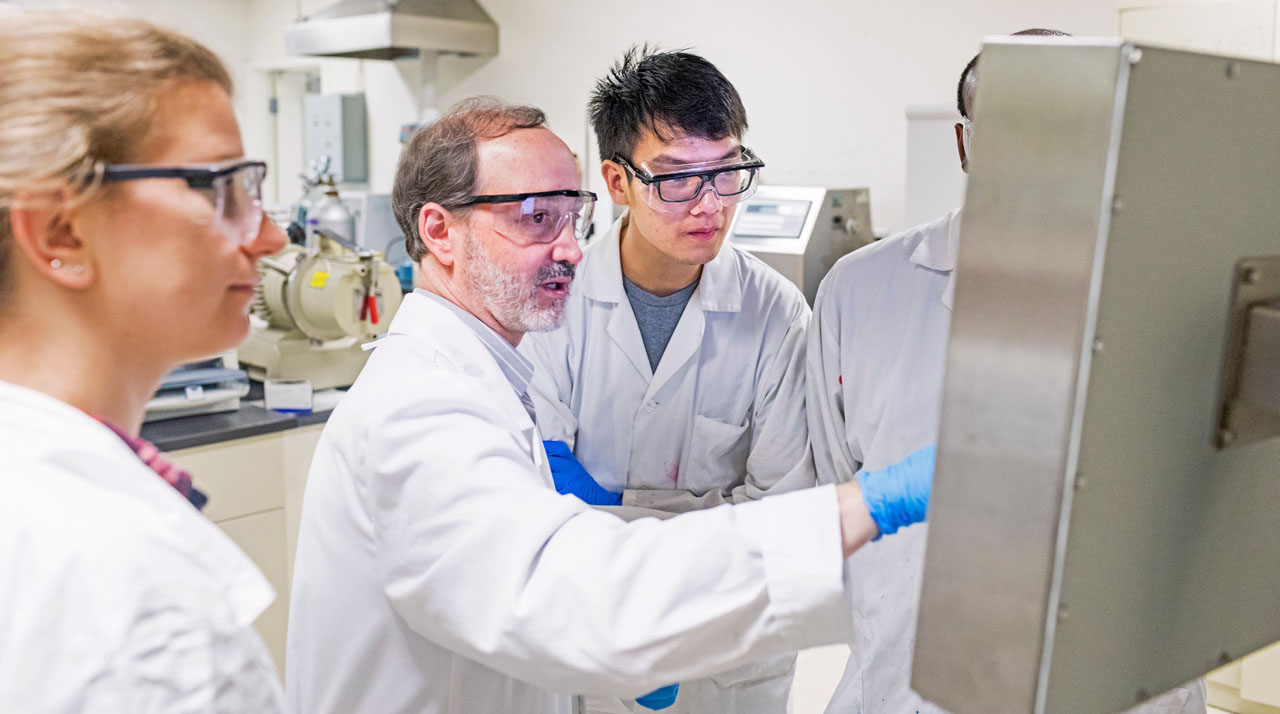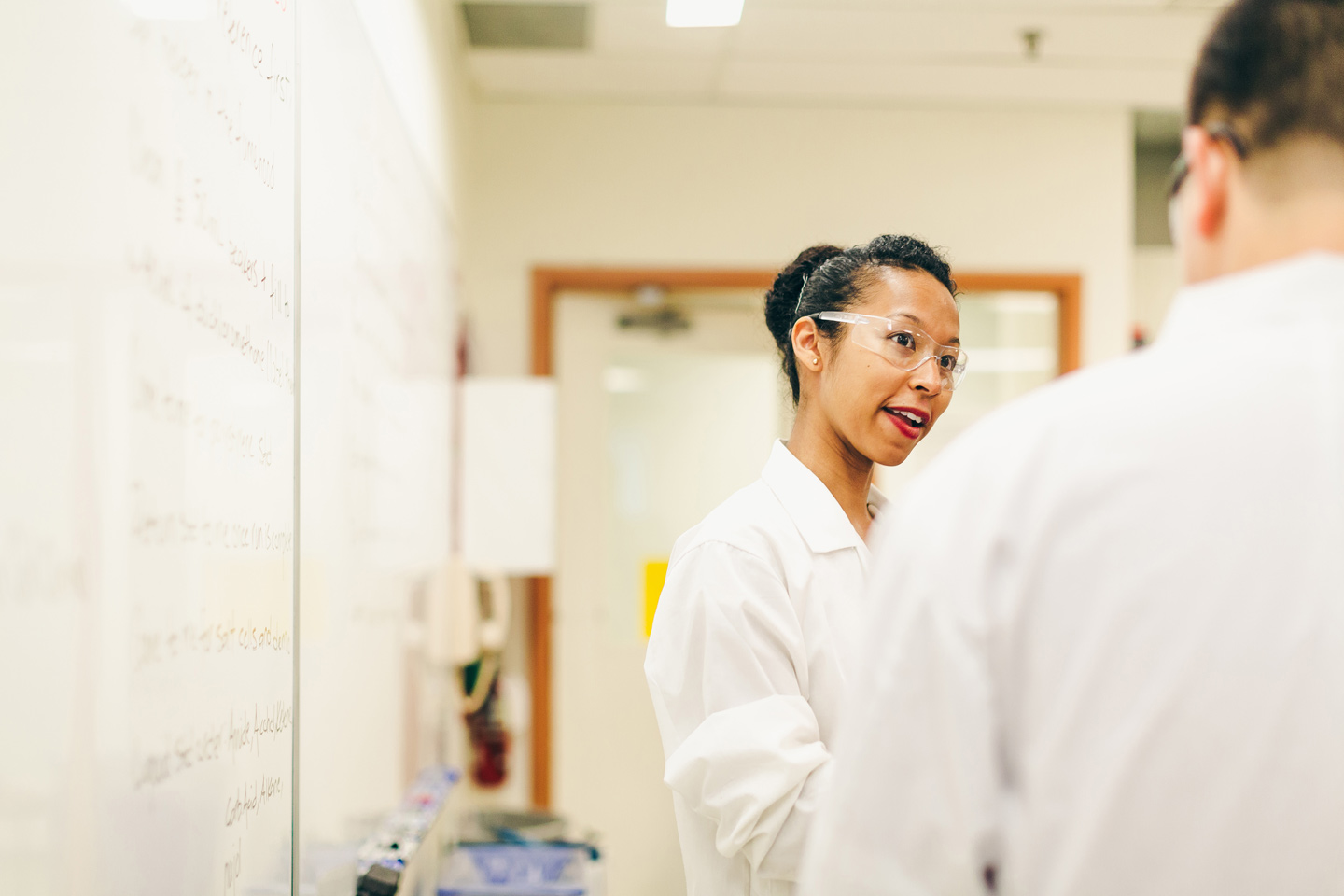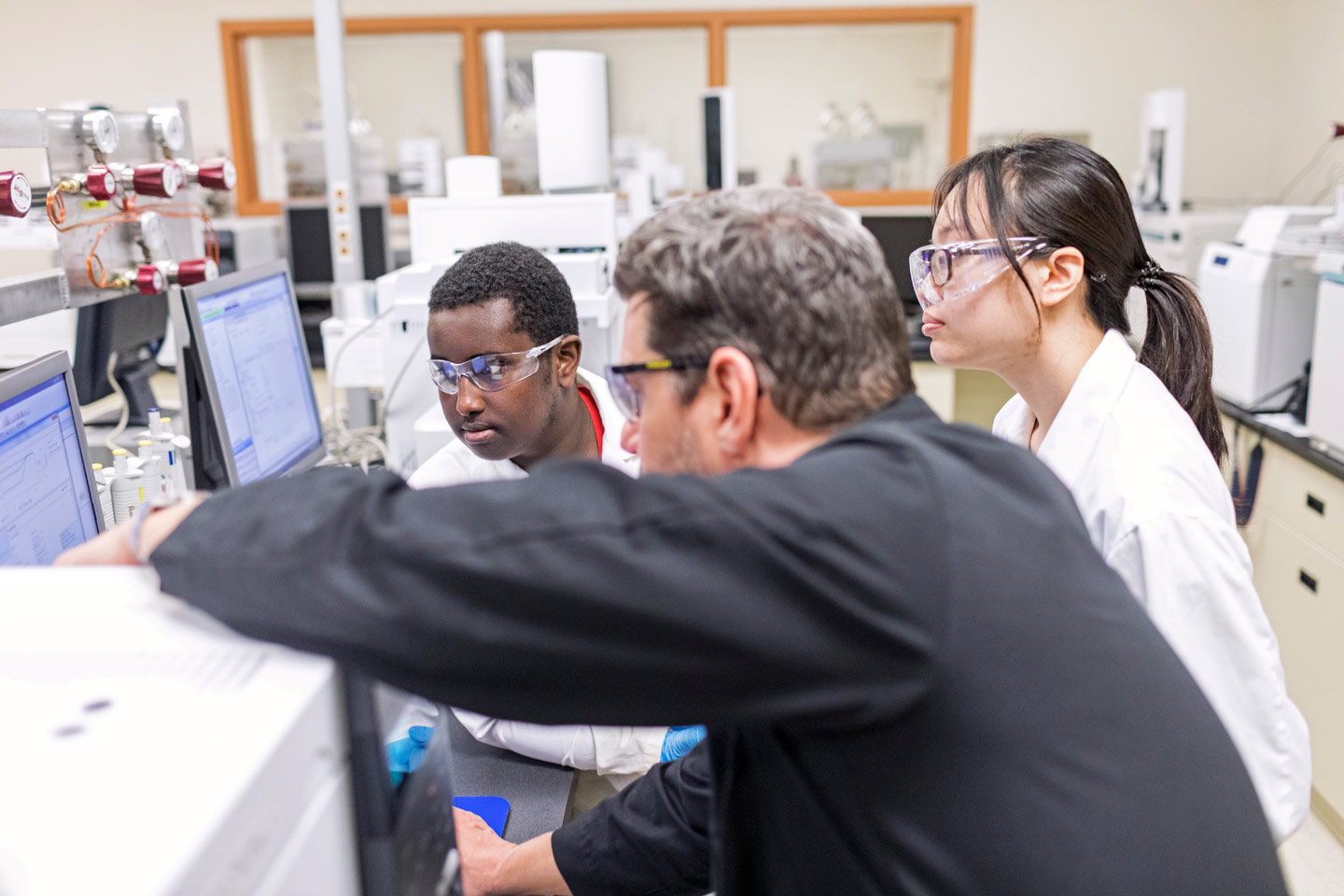Seneca’s Centre for Innovation in Life Sciences (SCILS) is supported by the Natural Sciences and Engineering Research Council of Canada (NSERC). We support product development, enhancement and validation in the life sciences and cosmetic science sectors with access to expertise from the students, faculty and infrastructure at Seneca.
Enabling industry-academic partnerships to develop, enhance and validate life sciences and cosmetic science technologies and products
SCILS Applied Research Areas of Focus
Life Sciences Diagnostics
Diagnostics in the life sciences include metabolomics testing, biochemical diagnostics, immunodiagnostics and molecular diagnostics that are used in either clinical or industrial settings. Developing, enhancing and validating these products is complex and costly. We address business-driven challenges and opportunities faced by regional companies in Canada’s life sciences sector to make diagnostics investments more feasible.
Novel Cosmetics Formulations
Developing safe cosmetic products with consumer appeal can be prohibitive. Seneca is home to Canada’s only cosmetic science program and we support companies nationwide in applied research.
Applied Life Sciences and Cosmetic Science Expertise

Assay Development and Validation
This includes developing novel techniques for testing the safety and/or efficacy of compounds and formulations and demonstrating correlation between such tests and real-world outcomes.

Product Formulation
Focusing on cosmetics and diagnostic reagents, this field involves the combination of active ingredients with excipients and meeting consumer preferences for colour, consistency and fragrance (in cosmetics), while also aligning with safety and efficacy expectations.

Method Development and Process Optimization
This area focuses on using novel analytical, biochemical and enzymatic methods to operationalize novel concepts and resolve product development challenges.

Product Stability Enhancement and Testing
Enhancing product shelf life of cosmetics and diagnostic reagents and validation of such enhancements, are addressed in this area.

Quality Control and Regulatory Affairs
Investigating regulatory requirements surrounding new products and processes, developing strategies to meet such requirements and formulating processes to ensure consistent product quality.
Infrastructure
Seneca is home to state-of-the-art technologies and instrumentation to support life sciences, diagnostics applied research studies and novel cosmetics science formulation projects. Our facilities support cutting-edge research and innovative applications relevant to experimental and in-depth analysis across the fields of analytical chemistry, molecular biology, biochemistry and cosmetic science.
Instruments
News
Project Spotlight
Investigating the Effects of Fungal Extracts on a Brain-in-a-Dish Model of Depression
Retagen Inc., a Toronto-based life sciences company, is collaborating with Seneca Innovation and the Seneca Centre for Innovation in Life Sciences (SCILS) to conduct research to test certain fungal extracts on brain-in-a-dish models developed by the company.
Dr. Frank Merante, Professor, School of Biological Sciences and Applied Chemistry, and a team of student researchers will work with the company to develop and validate experimental methods, which simulate depression in a model and can be used to reliably test substances. The aim of the study is to confirm the strength of Retagen’s technology in creating custom tissue culture assays that can be used broadly and for neurobiology or neurological conditions and testing.
Retagen’s technology and the resulting data could reduce the cost and time to market impactful treatments by accelerating early drug discovery and development processes. In addition, the company’s use of flexible, cell-type agnostic and scalable non-animal models have the potential to improve people’s lives and reduce animal cruelty.
Equity-deserving and vulnerable populations, as well as the broader society stand to benefit from the project, which is advancing potential treatments for depression.
Analysis of rheological parameters affecting long-term stability of product formulations
Principal Investigator: Dr. Barkev Keoshkerian
Partner: Vive Crop Protection
Funder: NSERC
Award Year: 2023
Vive Crop Protection is a Toronto-based chemical manufacturing company aimed at developing products and technologies to increase greater return-on-investment, efficiency and stability for farmers and growers. Vive Crop Protection will be partnering with Dr. Barkev Keoshkerian, Professor, School of Biological Sciences & Applied Chemistry, to explore factors that may be contributing to instability in the company’s agricultural formulations (e.g., insecticides, herbicides, fertilizers, etc.). Ideally, results from this project will identify specific physical-chemical parameters (i.e., rheology, particle size, etc.) that define certain limits that should be maintained to inform product formulation processes.
Facial Cosmetic Development
Principal Investigator: Sonal Kamath
Partner: Cela by Celine Tadrissi
Funder: NSERC
Award Year: 2023
Cela by Celine Tadrissi is a line of Canadian-made beauty and wellness products. Cela partnered with Seneca Polytechnic Professor Sonal Kamath, School of Biological Sciences and Applied Chemistry, to develop new formulations for facial cosmetics with Canadian ingredients. The result should lead to new cosmetic supply chains and increased visibility for Canadian-made skin-care products.
Protein Sample Preparation for Cryo-EM
Neoglacia Inc. creates a platform for preparing protein samples for cryo-electron microscopy (cryo-EM), which provides extremely high-resolution images. The Markham-based startup builds automated workflows to quickly get proteins ready for cryo-EM. The company is collaborating with Seneca’s Centre for Innovation in Life Sciences (SCILS) to create samples of specific proteins for use in the development and benchmarking of their technology. Frank Merante, Principal Scientist, SCILS, and Professor, School of Biological Sciences & Applied Chemistry, will lead a team of research assistants in purification and preparation experiments of proteins that present challenges for cryo-EM.
Second Harvest – Natural Cosmetics
Colour Lounge Inc. specializes in developing clean and sustainable skincare products made from plant-based ingredients sourced in Canada. The company based in Kingsville, about 360 kilometres southwest of Toronto, is partnering with Sonal Kamath, Professor, School of Biological Sciences & Applied Chemistry, and a team of student researchers to develop a toner, a moisturizer, and a cleanser as part of a new cosmetic line dubbed Harvest Moon. The Colour Lounge Harvest Moon line could be used as a focal point to enable conversations around initiating circular economy processes and the economic feasibility of agriculture waste reuse in southern Ontario.
Citrus Crop Impacting Agents- Rapid Point of Source Isothermal Molecular Detection Strategies by Isothermal Loop-Mediated Amplification
Principal Investigator(s): Frank Merante
Partner: EVIK Diagnostic Innovations Inc.
Funder: NSERC
Award Year: 2022
The U.S. citrus industry loses about $1 billion annually due to Candidatus liberibacter asiaticus, also known as Huanglongbing (HLB). It can ruin crop yields and hurt up to 5,000 industry-associated jobs every growing season. In addition, these pathogens are capable of spreading to other citrus crops, making it an emerging global problem.
This project will develop rapid, crop-side, point-of-source detection tests for citrus crop pathogens, in order to minimize damage, reduce costs and enable control measures. It aims to develop a panel of point-of-source, Loop-Mediated Isothermal Amplification (LAMP) detection tests for the most damaging bacterial and fungal agents that affect the U.S. citrus crop industry. There is rapid growth in this market.
Evaluating the Efficacy of IMED I-LID ’N LASH® HOCl Cleansing Spray
I-MED Pharma specializes in dry eye diagnosis and management. The Montreal-based company is collaborating with Dr. Frank Merante, Professor, School of Biological Sciences & Applied Chemistry, and a team of student researchers to evaluate and demonstrate the efficacy of a spray made with hypochlorous acid, a cleansing solution, to relieve dry eye symptoms.
Production of Nutraceutical in Yeast
Principal Investigator: Frank Merante
Partner: Wellesley Therapeutics
Funder: NSERC
Award Year: 2022
Wellesley Therapeutics seeks to maximize the utility of well-known medicinal substances through the development of innovative products. The Toronto-based pharmaceutical company is partnering with Dr. Frank Merante, Professor, School of Biological Sciences & Applied Chemistry, and a team of student researchers to explore methods of producing and optimizing the production of nutraceutical in genetically engineered yeast. Nutraceutical is known to repair joints, relieve inflammation and improve longevity; as such, the goal of the project is to engineer yeast to determine if an easily produced, non-animal source of nutraceutical is feasible.
Ostrich oil infused eczema cream
Ostrich Land, a family owned and operated farm located in Niagara Region, is dedicated to providing education and healthy products. Through its Power of Ostrich arm, Yelena Anikeyeva, Founder and CEO, has reached out to Seneca’s School of Biological Sciences & Applied Chemistry, specifically our Cosmetic Science graduate certificate program, to collaborate in the design and formulation of an eczema cream in which one of the core actives is ostrich yolk and/or oil.
Ostriches, having the most powerful immune system of any land animal, makes its oil the perfect product for aching joints, tattoo care, age control oil and stretch marks. Ostrich oil also has a smaller molecular makeup than emu oil making it transdermal. Sonal Kamath, Professor, School of Biological Sciences & Applied Chemistry, will lead the project, providing guidance and support to a Cosmetic Science work-integrated learning student working full time as a research assistant for the project. The resulting prototype cream from this project will be a critical addition, to what hopes to be, a line of natural cosmetics ostrich oil and yolk focused products for Ostrich Land (Power of Ostrich).
Partner with Us
We're here to support product development, enhancement and validation in the life sciences and cosmetic science sectors with access to expertise from students, faculty and infrastructure at Seneca.
If you are seeking expertise from Seneca to address a business challenge, please complete our project request form (DOCX) and email it to research@senecapolytechnic.ca. We will contact you for a discovery discussion.
Faculty
Paola Battiston

Paola Battiston is the Chair of Seneca's School of Biological Sciences & Applied Chemistry. She has led new program development in the school with the development and launch of graduate certificates and a degree program. She has also been a strong advocate for applied research initiatives engaging faculty and students. Ms. Battiston holds a bachelor of science and bachelor of education from the University of Toronto as well as a masters of education from Brock University. Her experience includes environmental and pharmaceutical industries, regulatory affairs and quality assurance.
Dr. Frank Merante

Dr. Frank Merante is the Principal Scientist for SCILS. He is a full-time professor in Seneca’s School of Biological Sciences & Applied Chemistry where he has also been instrumental in establishing applied research capabilities. He holds a PhD from the University of Toronto, and has traversed multiple disciplines including biochemistry, molecular biology and human genetics. Dr. Merante was the recipient of Seneca Innovation’s Research Leader of the Year Award in 2020.
Sharon Robertson

Sharon Robertson is a part-time professor in Seneca’s Cosmetic Science graduate certificate program within the School of Biological Sciences & Applied Chemistry. She holds a bachelor of science in chemistry and geology from the State University of New York. Ms. Robertson has substantial experience leading capstone and applied research projects in the Cosmetic Science program, bringing more than 30 years of experience in formulation and scale-up of colour cosmetics and toiletries. She also has advanced knowledge of cosmetic-related regulatory requirements for North America and Europe.
George Clark

George Clark is a full-time professor in Seneca’s School of Biological Sciences & Applied Chemistry. He holds a master’s degree in anthropology/archaeological sciences from the University of Manitoba and a bachelor of science in chemistry and general science from the University of Waterloo. He is a licensed archaeologist in Ontario and specializes in a range of inorganic analysis techniques and instrumentation. Mr. Clark also brings years of hands-on analytical instrumental experience through his experience in both industry and academia.
Dr. Jamie Cote

Dr. Jamie Cote is a full-time professor in Seneca’s School of Biological Sciences & Applied Chemistry. He holds a PhD in chemistry from the University of Alberta as well as a bachelor of science in chemistry from both Red Deer College and Carlton University. Dr. Cote specializes in organic analysis analytical chemistry, specialist instrumentation. Prior to teaching, he worked as a senior medicinal chemist at Dalton Pharma Services, working on numerous projects in drug discovery.
Barkev Keoshkerian

Barkev Keoshkerian is a part-time professor in Seneca’s School of Biological Sciences & Applied Chemistry. He holds a bachelor of science in biochemistry from the University of Toronto. He has more 38 years of industrial research expertise in a wide range of areas in polymer chemistry, colloid science (latex polymerization), pigment dispersions, ink design, coatings, materials science and composites. Mr. Keoshkerian has a well-established reputation as a creative researcher with more than 140 patents in various fields. He is the recipient of multiple excellence in research awards for polymer synthesis and applications.
Dr. Lesley Rutledge

Dr. Lesley Rutledge is a full-time professor in Seneca’s School of Biological Sciences & Applied Chemistry. She holds a PhD in biomolecular science from the University of Lethbridge and bachelor of education from Mount Saint Vincent University. Dr. Rutledge has extensive expertise in computational chemistry including density functional theory, molecular mechanics and molecular dynamics, and has taught science and mathematics in university and college settings.
Jim Cooper

Jim Cooper is a part-time professor in Seneca’s School of Biological Sciences & Applied Chemistry. He holds a master of science from the University of Guelph. His primary areas of expertise include biochemistry, molecular biology, microbiology, cell culture and animal husbandry.
Dr. James Mayo

Dr. James Mayo is a part-time professor in Seneca’s School of Biological Sciences and Applied Chemistry. He holds a PhD in chemistry from McMaster University focused on carbon nanotubes and reversible polymers. His industry experience includes more than 35 years as a Senior Scientist at Xerox Research Centre of Canada. His primary areas of expertise include organic and polymer synthesis, materials processing and scale-up engineering. He has also worked extensively in printing, with expertise in ink formulation, characterization and evaluation, as well as security printing.
Laboratory technicians
Laboratory technicians are an integral part of Seneca’s School of Biological Sciences & Applied Chemistry. They play a pivotal role in ensuring applied research projects are scientifically robust and well-documented. They also ensure laboratory facilities are operating with the greatest scientific rigor and the associated scientific instrumentation remains in optimal condition.
Research assistants (RAs)
Research assistants (RAs) are critical to the success of applied research projects. RAs carry out research activities working under the supervision and mentorship of project principal investigators, applying their academic knowledge and skills to project design, execution and reporting. RAs develop practical experience, advanced technical skills and professional skills relevant to a successful career in life sciences.
They are advanced-year undergraduate students from Seneca’s School of Biological Sciences & Applied Chemistry in the Biotechnology – Advanced advanced diploma program, Cosmetic Science graduate certificate program and Chemical Laboratory Technician diploma program. They also provide an opportunity for our industry partners to train RAs and hire them as highly qualified personnel who are oriented to the company and their R&D processes and strategy.
Funding Acknowledgement
We acknowledge the support of the Natural Sciences and Engineering Research Council of Canada (NSERC).
Nous remercions le Conseil de recherches en sciences naturelles et en génie du Canada (CRSNG) de son soutien.

































